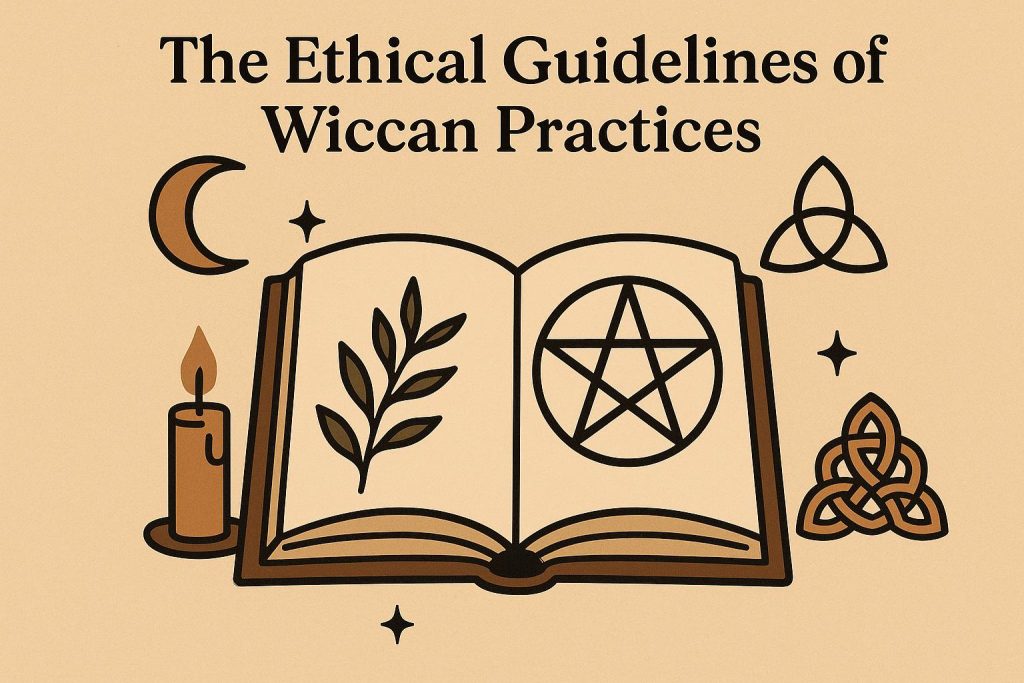
Understanding the Ethical Guidelines of Wiccan Practices
Wicca, a modern pagan religion, offers a rich tapestry of traditions and rituals centered on ethical guidelines that its practitioners endeavor to follow diligently. These guidelines serve as a compass, guiding practitioners in engaging with their spiritual practices in a manner harmonious with their beliefs. This article delves into the ethical principles inherent in Wiccan practices, exploring their significance and impact on the spiritual and daily lives of practitioners.
The Wiccan Rede
At the core of Wiccan ethics lies the Wiccan Rede, an essential maxim that can be concisely summed up as “An it harm none, do what ye will.” This exhortation forms the foundation of ethical discourse within the Wiccan community. While seemingly simple, this phrase encapsulates a profound guideline: practitioners are afforded the freedom to make their own choices, provided their actions do not inflict harm. This guiding principle nurtures a deep sense of personal responsibility while encouraging practitioners to embody respectful and ethical conduct towards themselves and those around them.
Within Wicca, the interpretation of harm is broad, encompassing physical, mental, and emotional dimensions. Practitioners are encouraged to constantly evaluate their decisions and actions through this lens, ensuring that their choices contribute positively to the lives of others and their own spiritual growth. Consequently, the Wiccan Rede fosters introspection, mindfulness, and a commitment to navigate the world with empathy and consideration for the well-being of others.
The Rule of Three
A pivotal ethical concept within Wiccan practices is the Rule of Three. Sometimes referred to as the Threefold Law, it posits that the energy a person releases into the world—be it positive or negative—will return to them threefold. This belief underscores the significance of intentionality in actions and thoughts, encouraging Wiccans to be consistently mindful of the energy they project.
The Rule of Three resonates deeply with practitioners, emphasizing the interconnectedness of individuals with the world around them. It suggests that actions, whether benevolent or malevolent, create ripples that eventually return to the originator. Consequently, this principle serves as a moral compass, urging practitioners to cultivate positive energy and act with integrity. It also underscores the continuous learning aspect of Wicca, as practitioners observe the consequences of their actions and adapt their behavior to align with the ethos of the religion.
The Rule of Three also functions as a spiritual safeguard, promoting accountability by reminding practitioners that their actions have consequences. It reinforces the notion that the energy they nurture and harbor will influence their own spiritual journey, making ethical considerations an integral part of their magical and mundane practices.
Respect for Nature
Embedded within Wiccan practices is a profound respect for nature, recognizing and revering the divine presence within the natural world. This respect is not merely an abstract concept but a guiding principle that informs the spiritual and ethical framework of Wicca. Many practitioners advocate for environmental stewardship, subscribing to the belief that the Earth and its diverse ecosystems are sacred and merit protection and reverence.
The ethical commitment to respect nature manifests in various dimensions of Wiccan practice. Rituals often incorporate elements of nature, signifying a deep bond with the Earth. At the same time, Wiccans are encouraged to lead lifestyles that minimize environmental impact. This ethos of stewardship transcends personal practices, inspiring many within the community to partake in broader environmental advocacy and conservation efforts.
The respect for nature also extends to the animal and plant kingdoms, emphasizing the interconnectedness of all living beings. This recognition of interdependence encourages practitioners to engage with the natural world thoughtfully and sustainably, fostering a sense of unity and reverence for life in all its manifestations.
Personal Growth and Responsibility
Central to the ethical fabric of Wicca is the emphasis on personal growth and the imperative of assuming personal responsibility for one’s actions. Wiccan ethics encourages practitioners to embark on a journey of self-improvement and spiritual evolution, striving for wisdom, ethical conduct, and a deeper understanding of themselves and the world around them.
Personal growth in Wicca is a holistic endeavor, encompassing spiritual, emotional, and intellectual dimensions. Practitioners are motivated to learn from their experiences, embracing challenges and setbacks as opportunities for growth. This emphasis on personal development aligns with the broader Wiccan belief in reincarnation and the continuous evolution of the soul.
Responsibility, in the Wiccan context, entails acknowledging one’s actions and their potential impact, embracing accountability, and striving for ethical integrity. The practice of introspection and reflection is encouraged, prompting individuals to evaluate their lives in alignment with their spiritual values. This focus on personal responsibility naturally extends to interpersonal relationships, fostering a culture of mutual respect, understanding, and support within the Wiccan community.
In pursuit of personal growth, practitioners often engage with various spiritual practices, including ritual work, meditation, and study of esoteric knowledge. These endeavors not only enrich their understanding but also cultivate a deep sense of connection to the divine forces that Wicca venerates.
Wiccan ethical guidelines provide a comprehensive framework for living a spiritually and ethically fulfilling life. While these guidelines offer a structured pathway, they are interpreted and internalized uniquely by individual practitioners, allowing the practice to remain vibrant, adaptive, and deeply personal. Each practitioner’s spiritual journey is a reflection of their understanding and application of these fundamental principles, contributing to the rich and diverse tapestry that defines the Wiccan community.
